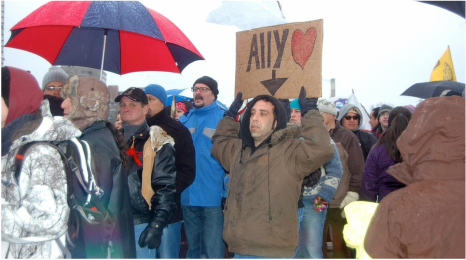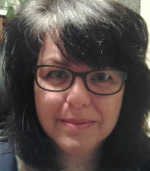 1. A colonized ally stands in the front. A decolonized ally stands behind. 2. A colonized ally stands behind an oppressive patriarchy. A decolonized ally stands behind women and children. 3. A colonized ally makes assumptions about the process. A decolonized ally values there may be principles in the process they are not aware of. 4. A colonized ally wants knowledge now! A decolonized ally values their own relationship to the knowledge. 5. A colonized ally finds an Indigenous token. A decolonized ally is more objective in the process. 6. A colonized ally equates their money and hard work on the land as meaning land ownership. A decolonized ally knows that land ownership is more about social hierarchy and privilege. 7. A colonized ally projects guilt. A decolonized ally knows it is their work to do. 8. A colonized ally projects emotions. A decolonized ally knows Indigenous people have too much to deal with already. 9. A colonized ally has no respect for Indigenous intellectuals. A decolonized ally knows Indigenous people have their own intellectuals. 10. A colonized ally has no idea they need to decolonize. A decolonized ally understands they have to continually decolonize. 11. A colonized ally has no idea of the concomitant realities of Indigenous oppression. A decolonized ally understands the many, layered, and intersectional oppressions Indigenous people live under. 12. A colonized ally speaks for Indigenous people. A decolonized ally listens. 13. A colonized ally takes on work an Indigenous person can do and is doing. A decolonized ally takes on other work that needs to be done. 14. A colonized ally makes things worse. A decolonized ally understands. 15. A colonized ally says, “It is time to get over it.” A decolonized ally realizes one’s relationship to the harm is subjective. 16. A colonized ally appropriates another nation’s Indigenous knowledge. A decolonized ally does the hard work to uncover their own Indigenous knowledge. 17. A colonized ally will loath this truth offered. A decolonized ally will recognize the hard work telling this truth is. Additional ally resources are available here  Lynn Gehl is an Algonquin Anishinaabe-kwe from the Ottawa River Valley. She has a section 15 Charter challenge regarding the continued sex discrimination in The Indian Act, and is an outspoken critic of the Ontario Algonquin land claims and self-government process. She recently published a book entitled Anishinaabeg Stories: Featuring Petroglyphs, Petrographs, and Wampum Belts, and her second book, The Truth that Wampum Tells: My Debwewin of the Algonquin Land Claims Process, will be published in March 2014. You can reach her at [email protected] and see more of her work at www.lynngehl.com. Please like and share this blog.
16 Comments
Heather Majaury
2/24/2014 12:59:42 am
Great.
Reply
2/24/2014 07:06:18 am
Brilliant! This is very helpful and greatly appreciated!
Reply
Gillette West
3/6/2014 07:29:17 am
Fancy meeting you here!
Reply
Margaret Fawcett
2/27/2014 11:07:31 pm
So humbling. This information invites me to walk softly and slowly with bare feet and listen deeply...trying not to cry continually.
Reply
Jennifer
3/3/2014 11:20:03 am
This article was really helpful for me; I can see how I've been a "colonized ally" in the past. I feel you've helped me gain some needed insight.
Reply
Andrea Desjardins Daily
3/3/2014 12:12:57 pm
Thank you. This is very helpful.
Reply
Gillette West
3/6/2014 07:28:29 am
Wonderful! Thank you!
Reply
6/21/2014 05:29:02 am
I really like this. It is honest and an insiders look at certain issues that are infecting the art world with tokenism right now....regrettably.
Reply
Joe Cowen
7/16/2014 04:21:41 am
Crazy... I found this article with my picture on it and the article is fantastic,
Reply
Lynn Gehl
7/16/2014 05:14:56 am
Kwey Joe, This is excellent. I love how clear you are about navigating the contradictions you embody. Keep in mind that identity is fluid (we are verbs not nouns) and as such there may be a time when you claim who you are as an Indigenous person.
Reply
Perhaps I can offer a middle path! I identify as both Ally & Indigenous. Ethnically my heritage is European & Afro-Latino. I carry distant Anishinaabe heritage through my Quebecois grandmother. I am neurodivergent ADHD - a highly absorbent super forager & intuitive kinesthetic multisensory relationship-centered learner. When I began learning Ojibwe & reconnecting with my Anishinaabe ancestry, I finally felt a sense of inner peace, a place where I don't have to constantly struggle to be in harmonious co-existance as I am wired naturally. So ethnicity-wise in the Colonial system I identify as White/Latino/Hispanic. Spiritually in my heart I self-identify as an Anishinaabe person because that is how I live & breathe. I understand the difference & so I tread respectfully. We can exist in many places at once.
Leon Cranebear
12/14/2014 02:41:46 am
Love the quote Lynn, "identity is fluid (we are verbs not nouns)." Is the quote available in a book, of ours? Thank you.
Reply
Lynn Gehl
12/14/2014 04:09:24 am
Kwey Leon,
Reply
12/14/2014 09:29:57 am
Thank you Lynn, and yes I was asking if the quote was available in any of your published material, as I think it is an excellent description of identity. Again, yes it is regarding a paper I'm doing.
Reply
Lynn Gehl
12/14/2014 09:59:18 am
Ok thanks. Did you see my work on identity under "academic publications" on my website? Here they are:
Reply
Your comment will be posted after it is approved.
Leave a Reply. |
|
To subscribe to Lynn's Blog: click here
To subscribe to Lynn's Newsletter: click here To follow Lynn on her Public Facebook Page: click here To subscribe to Lynn's YouTube channel: click here To book Lynn as a speaker: click here To contact Lynn/License her work: click here Copyright Dr. Lynn Gehl, 2024 All Rights Reserved
|
 RSS Feed
RSS Feed
